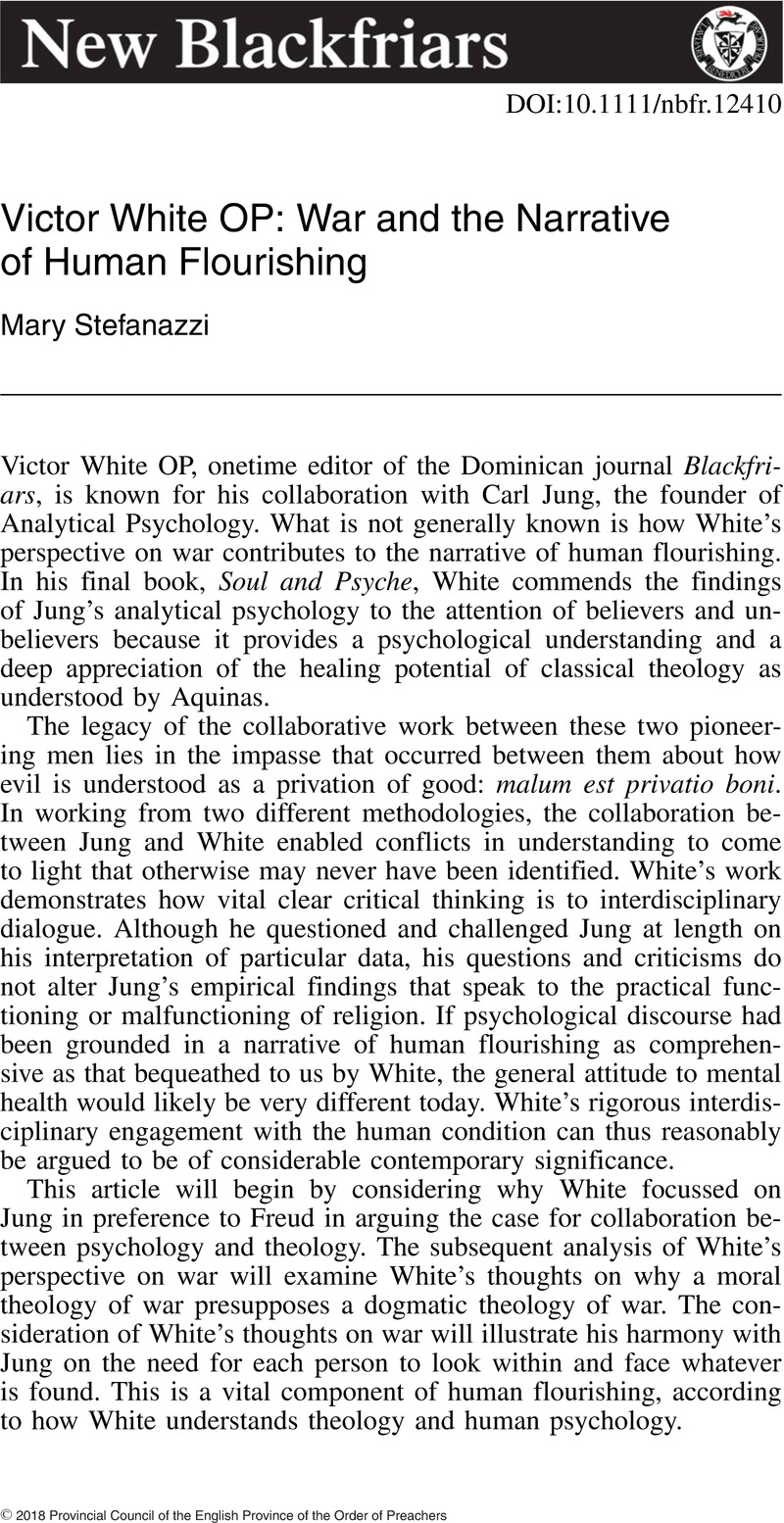No CrossRef data available.
Article contents
Victor White OP: War and the Narrative of Human Flourishing
Published online by Cambridge University Press: 01 January 2024
Abstract
An abstract is not available for this content so a preview has been provided. Please use the Get access link above for information on how to access this content.

- Type
- Original Article
- Information
- Copyright
- Copyright © 2018 Provincial Council of the English Province of the Order of Preachers
References
Carus, Carl Gustav, Psyche: On the Development of the Soul, Dunquin Series of rare monographs, (Dallas, Texas: Spring Publications, 1846/1989).Google Scholar
Cunningham, Adrian, ‘Victor White, A Memoir,’ in Lammers, et al., The Jung‐White Letters, pp. 307‐334.Google Scholar
Cunningham, Adrian, ‘Victor White, John Layard, and C.G. Jung,’ Harvest, 38, 1992, pp. 44‐57.Google Scholar
Jung, Carl Gustav, The Collected Works of C.G. Jung, noted as CW followed by volume. Editors: Read, Herbert, Fordham, Michael, Adler, Gerhard and executive editor McGuire, William. The volumes are published simultaneously by Princeton University Press, New Jersey, for the Bollingen Foundation, and by Routledge, London.Google Scholar
Jung, Carl Gustav, Aion: Researches into the Phenomenology of the Self, CW 9ii, (1959/1968).Google Scholar
Lammers, Ann Conrad, Cunningham, Adrian and Stein, Murray eds., The Jung‐White Letters, (New York: Routledge, 2007).Google Scholar
Lammers, Ann Conrad, ‘Bridge, Amalgam, Paper Clip: A Brief Typology,’ in Stein, Murray & Jones, Raya A. eds., Cultures and Identities in Transition: Jungian Perspectives (Sussex: Routledge, 2010), pp. 184‐189.Google Scholar
Weldon, Clodagh, & Bulkeley, Kelly eds., Teaching Jung, (New York: Oxford University Press, 2011).Google Scholar
White, Victor, ‘Scholasticism,’ in Studies in Comparative Religion, ed. by Messenger, E. C., (London: Catholic Truth Society, 1934).Google Scholar
White, Victor, ‘The Christian Revolution,’ Blackfriars, 15:167 February (1934), pp. 138‐149.CrossRefGoogle Scholar
White, Victor, ‘The Case for Italy,’ Blackfriars, 16:188, November (1935), pp. 807‐811.CrossRefGoogle Scholar
White, Victor, ‘Plain Talks of Fundamentals III – Revelation,’ Blackfriars, 17:200, November (1936), pp. 837‐842.Google Scholar
White, Victor, ‘Plain Talks of Fundamentals IV – Faith,’ Blackfriars, 18:202, January (1937), pp. 34‐41CrossRefGoogle Scholar
White, Victor, ‘Plain Talks of Fundamentals V – The Growth of Dogma,’ Blackfriars, 18:205, April (1937), pp. 273‐278.Google Scholar
White, Victor, ‘Catholics and War: The Principles Involved,’ The Catholic Herald, issue of 12th May 1939, p. 6.Google Scholar
White, Victor, ‘War and rumours of War,’ Blackfriars, 20:231, June (1939), pp. 403‐413.CrossRefGoogle Scholar
White, Victor, ‘War and the Early Church,’ Blackfriars, 20:234, September (1939), pp 643‐654.10.1111/j.1741-2005.1939.tb00218.xCrossRefGoogle Scholar
White, Victor, ‘The Frontiers of Theology and Psychology,’ Guild of Pastoral Psychology Lecture No. 19, (1942).Google Scholar
White, Victor, ‘St. Thomas Aquinas and Jung's Psychology,’ Blackfriars, 25:291, June (1944), p. 209‐19.CrossRefGoogle Scholar
White, Victor, ‘Psychotherapy and Ethics,’ Blackfriars, 26:305 August (1945), p. 287‐300.CrossRefGoogle Scholar
White, Victor, ‘Psychotherapy and Ethics: A Postscript,’ Blackfriars, 26:307, October (1945), p. 381‐386.Google Scholar
White, Victor, God and the Unconscious: An Encounter between Psychology and Religion, (London: The Harvill Press, 1952).Google Scholar
White, Victor, Soul and Psyche: An Enquiry into the Relationship of Psychotherapy and Religion, (London: Collins and Harvill Press, 1960).Google Scholar
White, Victor, ‘Good and Evil,’ Harvest, 12 (London: Analytical Psychology Club, 1966), pp. 16‐34.Google Scholar


